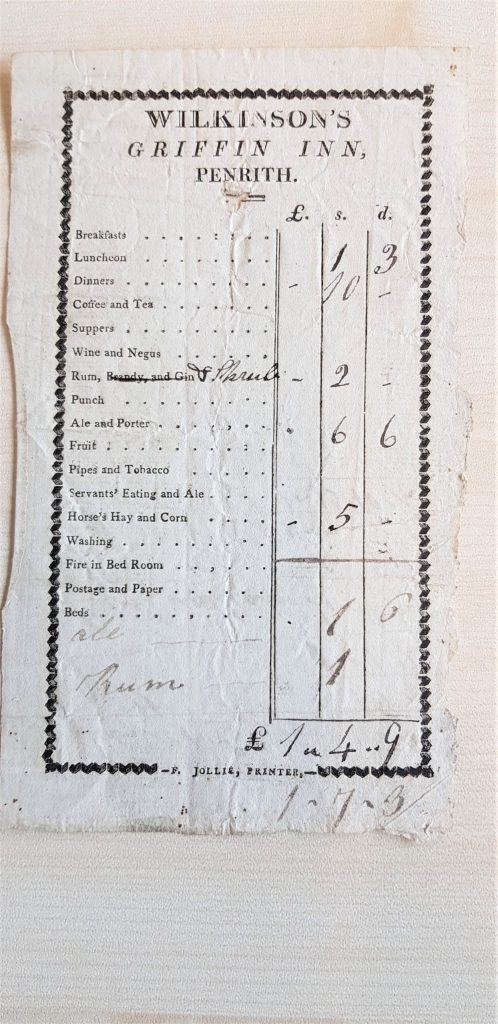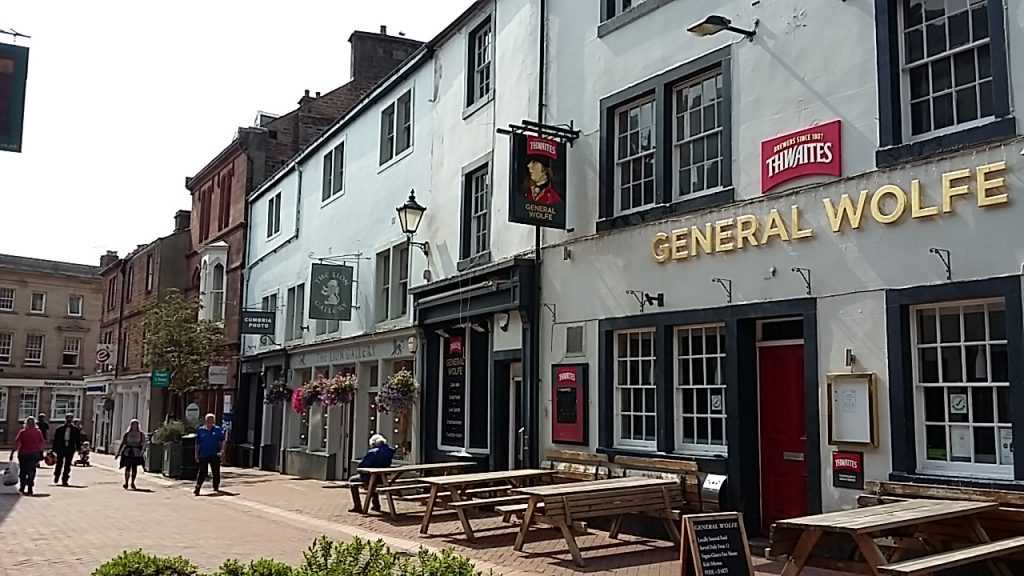The Griffin Inn was one of the numerous inns in Penrith during the late eighteenth and nineteenth centuries. It was listed as being situated in the urban subdivision of Dockray and in later years the Corn Market. It was part of the social and commercial centre of the community, helping to promote the economy of the town, providing a venue for local officials, manufacturers and traders and those selling property. It was a place for social and cultural events providing accommodation for passing travellers, those on fishing excursions to Ullswater, and travelling performers as well as members of the Cumberland Militia that assembled and trained there in the early 1800s.[1] Grain was sold outside the various inns positioned round the Cornmarket; barley was sold from outside the Griffin.[2]
The Griffin Inn had been trading from at least 1779 when innkeeper Christopher Idle offered for lease a:-
Large and convenient dwelling house with a large hall or kitchen, parlour, back kitchen and brew house on the first floor, a large dining room, a small ditto, three lodging rooms for servants, three cellars, both dining room and lodging rooms have closets. Good stables for eighteen horses, common stables for fifty more, a byer for cows, roomy chambers for hay, three extraordinary good granaries, a pump, coal holes and every necessary convenience the whole situate within a large close yard. The stock and furniture to go with the premises it also a good seat in the Parish Church.[3]
One voucher from Threlkeld with no clear date has the letterhead ‘Wikinson’s the Griffn Inn’. Scribbled on the back are additions to the bill. It is probably dated from the end of the eighteenth century. It does give an brief insight into the business of the Griffin. Wilkinson supplied the customers with a range of alcoholic drinks, mainly ale and porter; luncheon and dinner, tobacco, beds, horses hay and corn along with the services of an ostler. The printed bill also shows the Griffin offered fruit, punch, tea and coffee, wine and negus, washing facilities, postage and paper as well as food and ale for servants. [4]

John Wilkinson and his wife Julia Harrison were married at Thorpe in the parish of Greystoke in 1789 but perhaps seeing a lucrative business opportunity moved and became the proprietors of the Griffin around the time of the birth of their second son, William in 1795. William did not survive beyond his first year, as was also the case with sibling John (b.1799).[5]
After John Wilkinson’s death in 1801, [6] it is not known if Julia had full control of the inn or a trustee was appointed. However, the lease of the Griffin was offered for nine years in February of that year. The Griffin being described as in the possession of Mrs Wilkinson.[7] Little can be found of the Griffin’s activities until 1811 when Jollie’s trade directory lists Julia Wilkinson as the Innkeeper.[8] She remained at the inn and was still there when her father Jonathan Harrison died in 1818[9] and when her daughter Mary married the Rev. John Ormandy the following year. [10] Mary died in a house fire on 27 December 1848 ,the suggestion in one local newspaper being that her being intoxicated was partly to blame.[11]
The General Wolfe inn near the Griffin, where Isaac Wilkinson was the innkeeper was continued by his only daughter Mary after his death in 1823.[12] She had married William Bolton a Sergeant Major in the Cumberland Militia in 1802. Widowed in 1824 she continued in business at the inn. [13] It may be that the two Wilkinson families were related.
In 1819 local newspapers carried family notices suggesting that Julia Wilkinson had remarried. The notice in the Carlisle Patriot of 31 July read ‘At Greystoke Thursday Mr Isaac Hodgson of London Slop Merchant to Mrs Wilkinson late of the Griffin Inn Penrith’. [14] A slop merchant provided clothes and bedding to sailors; often they were cheap and of poor quality. Indignant at this announcement, the same paper retracted this two weeks later, claiming it a falsehood. The instigator was unknown.[15] Julia Wilkinson died sometime around 1824. [16]
In 1811 the Wilkinsons’ eldest surviving son, Harrison, became a surgeon in Hounslow, Middlesex. Prior to that he had been in the Royal Navy.[17] The other Wilkinson children didn’t follow their parents into the innkeeping trade. The Griffin was once again offered for lease, with the addition to its facilities being a garden. Particulars of the lease were to be had from Thomas Wilkinson [John and Julia’s son] of Thorpe House, Greystoke.[18]
The will of Harrison Wilkinson (1790-1830) identifies family members. Apart from some small bequests he instructed his trustees to divide most of his estate between his brother Thomas (1797-1860) and two sisters Mary (1791-1848) and Ann or Nanny (1800-1865). The Griffin made up part of his estate. Dorothy the eldest daughter of his sister Mary was to benefit from the profits of the Griffin independent of her parents or husband, then subsequently the female lineage [her sisters or daughters]. The female heirs were always to be preferred before the male. Youngest sister Ann named Smith in the will, later married James Rowntree, a successful gun maker of Penrith and Barnard Castle. She was resident in Penrith when she died in 1865. She, like her siblings benefitted from her brothers estates at Townhead, Penrith; and Thorpe and Field House, in Greystoke parish.
Perhaps mindful of his own endeavours to gain an education and the lack of a public library in his early life, Harrison added a codicil to his will. He asked for his books comprising his library, to go to the president and committee of the public library free of all legacy duty for the use of all the inhabitants of Penrith.[19] They went to the Mechanics Institute, the forerunner of the Public Library. [20]
Julia Wilkinson appears to have been the only female owner among the Griffin’s various hosts before it ceased trading in March 1893. Adam Barker, a farmer who had taken possession of the Inn in October 1892, was adjudged bankrupt the following year.[21] The General Wolfe fared better and continues in business.

sources.
[1] Ewanian (William Furness), History of Penrith from the Earliest Record to the Recent Time, (1894) Reprint Carlisle Bookcase, pp. 179-185. Michael Mullett, A New History of Penrith, Book V, Penrith in the Nineteenth Century. 1800-1901 (Carlisle, Carlisle Bookcase, 2020), pp. 46-49; Westmorland Advertiser and Kendal Chronicle 26 June 1813, p.3, col., d
[2] www.penrithtowntrials.co.uk http://www.penrithtowntrails.co.uk/downloads/cornmarket.pdf
[3] Cumberland Pacquet and Ware’s Whitehaven Advertiser, 8 June 1779, p.1, col. b.
[4] Cumbria Archives, Threlkeld Overseers’ Vouchers, SPC21/8-11 13A and 13B, no date
[5] www.ancestry.co.uk
[6] Cumbria Archives PROB/1801/A(44) John Wilkinson Innkeeper Penrith
[7] Carlisle Journal, 7 February 1801, p.1, col. d.
[8] Jollie, F. Cumberland Guide and Directory (Carlisle, 1811), p. xxxi.
[9] Cumberland Paquet and Whitehaven Ware’s Advertiser, 8 September 1818, p.3, col. a.
[10] Carlisle Patriot, 20 February 1819, p. col. d.
[11] Kendal Mercury ,6 January 1849 p.2, col., g
[12] Cumbria Archives, PROB/1823/W723, Isaac Wilkinson Innkeeper, Penrith, 1823, Cumberland Paquet and Ware’s Whitehaven Advertiser 17 February 1823, p.3, col. c.
[13 Pigot & Co., National Commercial Directory, Cumberland, Lancashire, and Westmorland 1828-9 (London and Manchester, J Pigot & Co., 1828).
[14] Carlisle Patriot, 31 July 1819, p. 3, col. d.
[15] Carlisle Patriot, 14 August 1819, p.3, col. d.
[16] Cumbria Archives, PROB/1824/A(25), Julia Wilkinson, widow of Thorpe. 1824.
[17] UK City and County Directories 1766-1946, 1811, London County Directory, p. 1566 [accessed at www.ancestry.co.uk, 25 August 2020].
[18] Carlisle Patriot, 17 December 1825, p.1, col. e.
[19] National Archives, Prerogative Court of Canterbury, PROB11/1792/175, 3 November 1831, Will of Harrison Wilkinson of Hounslow, Middlesex.
[20] Cumberland and Westmorland Herald, 20 January 1883, p.5 cols. a-b.
[21] Cumberland and Westmorland Herald, 11 March 1893, p.4 col. g.
Research is ongoing and additional information may by gained accessing the following :-
DHOD/15/7, 1831-36, Estate of Harrison Wilkinson deceased and residue to Mrs Smith, Gosling Cottage, Carlisle.
DHOD/15/10 1830-38, Papers, estate of Dr Harrison Wilkinson, deceased.